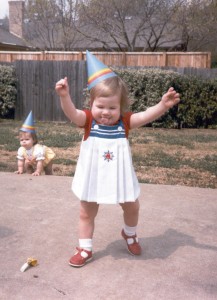Such energy, such determination, such inspiring plans! For a scant two decades of life, you sure are cocky. You know you’re book-smart. You’ve known that since you won that homonyms contest in fourth grade. You are beginning to believe that you are beautiful. This, thanks to a campus full of testosterone-driven boys, boys who didn’t know your gawky, clumsy, yet brainy seventh grade self, towering intimidatingly above their skinny, pre-hormonal selves. You have a dad who has preached, from his perpetual preacher’s stance, that not only are you smart and beautiful, you can expect to accomplish whatever you want. All a recipe for cocky certainty.
The perfect life, defined by boxes to be checked off, is one you feel certain to build. Certain you will finish the current psychology degree and the next, to take you on your chosen path of meaningful, yet financially stable work. Work that will make a difference in the lives of others yet still allow that ever-important flexible mom schedule. Certain you can build a relationship with the ideal loving man and establish a home for children, another way you plan to contribute to the world. Certain that if you do all this in the Right Order: finish school and training, snag the guy, launch the career, then and only then produce that yearned for grand-baby; your life will be perfect. You will be happy. Fulfilled. Productive. Balanced. Parents proud. You will be in control.
I bite my tongue to stop the inevitable tsk, tsk from escaping my head. You are twenty and know it all! Yes, it will work out, though I really don’t need to tell you that. Most days, you simply, whole-heartedly, are certain fairy tales come true. Allow that belief to carry you far, quieting those doubts that bubble up in the still night hours, dark-thirty. Because even as you barrel on, the ruts of doubt deepen, parallel paths that die hard. From a quarter century later, I see the undercurrent to your bravado, hidden depths of worry, doubt, full-fledged anxiety. Are you really good enough? Lovable enough? Do you matter enough?
Drink and dance hard, do your homework, flirt with boys. Charm the professors, call home once a week, volunteer for the crisis hotline. Be on time, shelve stacks of library books, save your money. Be the good girl, do what smart girls do, and maybe that will be enough to fill those ruts, dam that undercurrent. Jump through the right hoops, and you’ll feel in control.
Control is an illusion, my dear. You think the grand design in your head will automatically come true, detail by precious detail, because it’s what you want and you’re doing the right things. Dreams come true. Yet, like constantly shifting clouds, the only certainty is that the dream morphs. You envision one prince charming; another is, in fact, the one you need. You imagine constantly adoring and adored children; the vehemence that can fly both ways at 2 and 13 is horrifying. You paint the picture of one life; destiny insists you’ve drawn this lot instead.
I know you’re afraid of heights, but this is not one of those dreaded fire towers that your parents dragged you up, open wooden steps with a shaky splintered railing. As the path you plan to forge diverges, step back, climb to the highest point, and seize the bird’s eye view–in spite of your fear. If you’d taken the predictable, planned path, you would have missed this gorgeous vista.
Surrendering to uncertainty is not a concept you embrace as part of your grand life plan and it’s illusion of control. Surrendering to reality equates to loss. Grab the box of tissues, release the tears, this isn’t what you ordered. You are certain surrender looks like this: pain, suffering, anxiety to be feared: 
When in fact, surrender looks like this:
You think you know it all, and that, in true all or nothing style, the details are essential to fulfillment of the plan. You are certain that achieving the plan, unaltered, will bring peace and security. Failure, defined in that absolute way, means no rest from the worry and doubt. Give it up. Surrender is acknowledging the illusion that you are in charge. Simply, wholeheartedly, be certain about that truth, and allow life to delight you with surprising vision. That is, after all, exactly what you need.
***********************************************************
This post is part of a BlogHop for a group of midlife bloggers called Generation Fabulous (GenFab for short).



